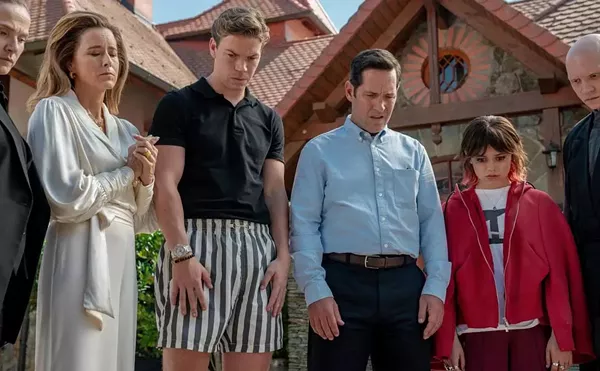Though rarely seen in the United States since its initial release in 1966, many esteemed critics regard this movie as one of the best films ever made. Its creator, French director Robert Bresson (1907-99), made only 14 features during his long career; most are out of print on video and awaiting conversion to DVD. So the chance to see any Bresson newly restored and on the big screen is an event bound to make most cineastes’ mouths water.
Unfortunately, the version I saw for this review was a so-so print with one crucial night scene darkened to the point of opacity. This may have contributed to my initial reaction that Balthazar not only is not one of the best films ever made, it is not one of Bresson’s best, either. But, given the general excellence of the director’s oeuvre, that’s praising with faint condemnation.
Balthazar’s titular character is a donkey, and the film follows his short and brutish life from an idyllic farm beginning through exploitation at the hands of cruel or indifferent owners. Paralleling his story is that of Marie, his first owner, a young girl who makes a similar journey.
With Balthazar the donkey, Bresson — who liked to keep his films free of dramatic flourishes and preferred to work with nonprofessional actors — seems to have found his ideal leading man. Balthazar brays with heartrending emotion when under duress but his impassive demeanor invites the viewer to interpret his deeper feelings, if any. Bresson’s specialty — the depiction of characters responding to their harsh surroundings with a stoicism bordering on the mystic — is an anti-cathartic approach. But in his best films, like The Diary of a Country Priest (1950) and Mouchette (1967), the cumulative quietude draws the viewer into a state of sympathetic contemplation.
This makes Bresson a “difficult” director. Even people bored with mainstream movie machinations expect a certain amount of expressive drama from a film, and Bresson’s oblique and placidly observant approach can seem a little flat. For example, the ambush and beating of Marie by a gang of local delinquents is presented in such a circumspect manner that it takes a while to figure out what actually happened. And the complex details of the plot, involving the fate of Marie’s farm and her family, are revealed in such a way as to seem unimportant.
But with Bresson, patience is rewarding, and not just because Balthazar has an ending both strangely beautiful and profoundly sad. It’s worth the effort to connect to this singular vision, one that’s austere and humane in equal measure. There’s a wealth of feeling here but it’s never thrust at the viewer. When one opens up to it, it feels like a revelation. —
In French, with English subtitles. Showing at the Detroit Film Theatre (inside the DIA, 5200 Woodward Ave., Detroit), Friday-Sunday, Feb. 20-22. Call 313-833-3237.
Richard C. Walls writes about film for Metro Times. E-mail [email protected].





